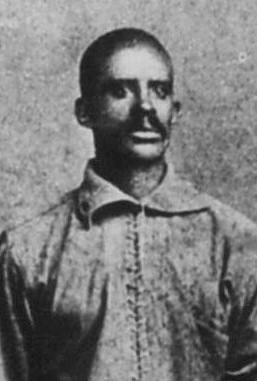
Bud Fowler (National Baseball Hall of Fame and Museum)
Bud Fowler was the earliest known African-American player in organized professional baseball, as well as the first to play on integrated teams. Born John W. Jackson on March 16, 1858, Fowler was the son of a fugitive slave-turned-barber. His father had escaped from slavery and migrated to New York, eventually settling in Cooperstown. The young John Jackson learned to play baseball during his youth in Cooperstown, but it remains unknown why he went on to adopt the name “Bud Fowler.”
Fowler learned to be a barber like his father, working in the profession to supplement his income while he played ball. He played amateur ball for a few years, and his first year of prominence in the game came in 1878 at the age of twenty. By this time John W. Jackson was calling himself “Bud Fowler,” and would be known by this moniker throughout his baseball career. On April 24, 1878, he pitched a game for the Chelsea Picked Nine, who defeated the Boston Red Caps, champions of the National League in 1877. He pitched some more for the Chelsea team, then played a few games with the Lynn Live Oaks, and finally finished that season with the Worcester club.
The Lynn Live Oaks were a member of the International Association (IA), considered by some historians to be the first minor league, as they operated in cooperation with the National League. Thus, with his stint with the Live Oaks in 1878, Fowler became the first African-American to integrate a team in minor league history, and thus the game’s first African-American professional ballplayer.
Continuing to support himself as a barber, Fowler went on to play for baseball teams in New England and Canada for the next four years. He then moved to the Midwest, playing for teams in Niles, Ohio and Stillwater, Minnesota with the Northwestern League.
Fowler initially signed with the Stillwater team as a catcher. However, after the club lost its first fifteen games, Fowler was put on the mound. On May 25, 1884, he led the team to its first victory, a 13-7 win over Fort Wayne. The team relied heavily on his right arm from that point on, and Fowler delivered, winning five of Stillwater’s first seven victories. All his time on the mound took its toll on his arm, however, and that season marked his transition from the battery to the infield.
Fowler signed with the Keokuk (Iowa) club in February 1885 where he quickly became the most popular player on the team as a second baseman. Fans and newspapers alike admired not only his abilities as a ballplayer, but also his intelligence and his “gentlemanly” conduct. Unfortunately, the Western League folded in mid-June due to financial reasons, leaving Fowler without a team.
After short stints in St. Joseph, Missouri and in Portland, Maine, Fowler signed with the Pueblo Pastimes of the Colorado League to finish out the year. The impression he left in Colorado became evident when the Rocky Mountain News commented, “A league of colored baseball players has been organized in the South. It is safe to say there will be few of them as good as Fowler.” The following season, in 1886, Fowler joined a team in Topeka, Kansas where he led the league in triples, helping Topeka to the pennant.
Fowler continued to journey from team to team, however, racial tensions were starting to become more and more pronounced. One Sporting Life article commented, “Joe Ardner, in one game he played, shows himself to be … far superior to the ‘coon’ Fowler on second base.” Around this time, some exclusively black baseball leagues were forming, though Fowler continued to play on integrated teams, in spite of the racism he faced. In 1887, however, nine of Fowler’s white teammates with the Binghamton team signed a petition demanding that Fowler and black teammate William Renfro be released or they would quit. Finally fed up with the struggle, Fowler requested and was granted his release from the Binghamton team in late June.
Shortly after Fowler’s release, the International League formally banned any additional signings of African-American players.
Fowler continued to play for various integrated teams in other leagues over the next several years. However, racism was becoming more and more of an issue. In the fall of 1894, conditions led him to organize the Page Fence Giants, an all-black team sponsored by the Page Woven Wire Fence Company of Adrian, Michigan. From 1894 to 1904, Fowler played and/or managed the Page Fence Giants, the Cuban Giants, the Smoky City Giants, the All-American Black Tourists, and the Kansas City Stars.
At the end of his career Bud Fowler insisted that he had played on teams based in twenty-two different states and in Canada. No doubt the journeyman characteristic of his long baseball career was due in large part to the racism factor.
Bud Fowler died on February 26, 1913 of pernicious anemia after an extended illness, just shy of his 55th birthday.

